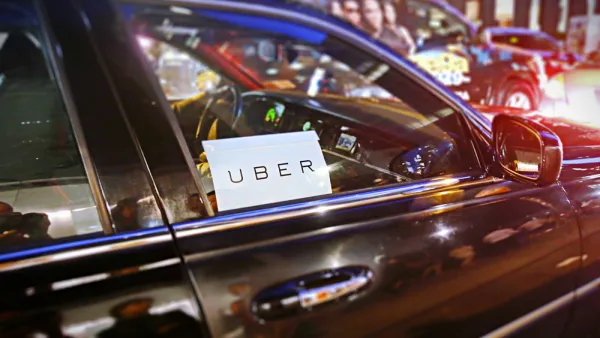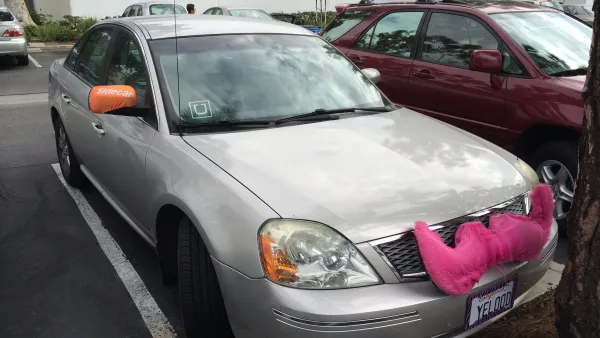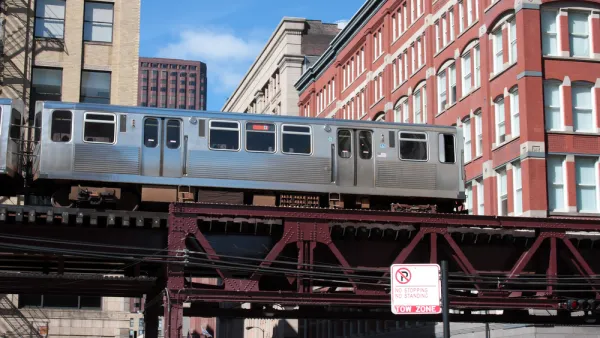Thanks to technology-enabled ride-hailing services, more households have the ability to go car-lite now than in preceding generations, according to a new study prepared for the American Public Transportation Association.
"At a press conference announcing a new study about mobility in American cities on March 15, Lyft’s director of transportation described her company and competitor Uber as 'allies'," writes Katy Steinmetz, chief of Time Magazine's San Francisco Bureau. What was more remarkable that the two competitors calling themselves allies, though, was that 39-page study [PDF] was prepared not for the ride-hailing industry but for the American Public Transit Association (APTA).
"Using Uber and Lyft is a gateway to a car-lite lifestyle, with users owning fewer cars in a household, according to the study," according to APTA's press release.
Now, I was unaware that "car-lite" (not "car-light") is a well-established term in transportation terminology. "We can make better cities by increasing the size and number of neighborhoods in which it's possible for the average person to live partially—not completely—car free," writes Daniel Herriges of Strong Towns. "There's a lot of value in living a car-lite lifestyle, and that's something available right now to many times more Americans than can currently, realistically, go car-free."
APTA "analyzed the usage of personal cars, public transit and other 'shared modes'—such as bikesharing, carsharing and the use of ride apps such as Uber and Lyft—in seven major cities: Austin, Boston, Chicago, Los Angeles, San Francisco, Seattle and Washington, D.C., " writes Steinmetz.
"This study was conducted by the Shared-Use Mobility Center (SUMC), with funding provided through the Transit Cooperative Research Program (TCRP). The study "suggests public transit and ridesourcing services such as Uber and Lyft are largely complementary, with each serving different trip types but working together to enhance urban mobility and decrease reliance on private autos," notes SUMC's press release
About SUMC: "The Shared-Use Mobility Center (SUMC) is a public-interest organization working to foster collaboration in shared mobility (including bikesharing, carsharing, ridesharing and more) and help connect the growing industry with transit agencies, cities and communities across the nation...."
FULL STORY: Time: Lyft and Uber Are ‘Allies’ in the Transit Revolution

National Parks Layoffs Will Cause Communities to Lose Billions
Thousands of essential park workers were laid off this week, just before the busy spring break season.

Retro-silient?: America’s First “Eco-burb,” The Woodlands Turns 50
A master-planned community north of Houston offers lessons on green infrastructure and resilient design, but falls short of its founder’s lofty affordability and walkability goals.

Delivering for America Plan Will Downgrade Mail Service in at Least 49.5 Percent of Zip Codes
Republican and Democrat lawmakers criticize the plan for its disproportionate negative impact on rural communities.

Test News Post 1
This is a summary

Test News Headline 46
Test for the image on the front page.

Balancing Bombs and Butterflies: How the National Guard Protects a Rare Species
The National Guard at Fort Indiantown Gap uses GIS technology and land management strategies to balance military training with conservation efforts, ensuring the survival of the rare eastern regal fritillary butterfly.
Urban Design for Planners 1: Software Tools
This six-course series explores essential urban design concepts using open source software and equips planners with the tools they need to participate fully in the urban design process.
Planning for Universal Design
Learn the tools for implementing Universal Design in planning regulations.
EMC Planning Group, Inc.
Planetizen
Planetizen
Mpact (formerly Rail~Volution)
Great Falls Development Authority, Inc.
HUDs Office of Policy Development and Research
NYU Wagner Graduate School of Public Service





























